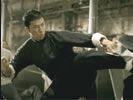Eye For Film >> Movies >> Ip Man (2008) Film Review
One of the key traits of an interesting protagonist is complexity - a character who not only faces external conflicts but also internal struggles and doubts that sucker the viewer into sympathising or empathising with them or, at least, give an understanding of their motivations. The biographical form adds an extra challenge to creating a good protagonist: how do you balance a life story with the needs of dramatic conflict? When is the best period of time to illustrate the subject’s depth? How much is too much reverence for a person? These are a few of the issues that dog director Wilson Yip’s Ip Man as a piece of storytelling.
Despite his relatively unknown status outside of the martial arts world, Grandmaster Ip – AKA Ip Man – would, in later life, have a huge influence on cinema as the mentor of one Bruce Lee, who was a disciple of Ip’s Wing Chun style. As the first semi-biographical film (with a second in the production stages and a third currently in development), Ip Man makes a big misstep by beginning its story at a point where Ip is already fully trained as a martial artist and living prosperously with a wife and kid, while his origins remain unknown. Donnie Yen’s performance as Ip may be nuanced, but as a consequence of narrative decisions, we don’t see Ip develop either as a fighter or a character - we only see him as the skilled master.

Another strange choice is to begin the story in 1935 - with Ip forced into defending the honour of his province of Foshan against outsider martial artists - only to jump forward in the second act to 1938, in the midst of the Japanese army invasion of Foshan. While both plotlines are thematically linked and, combined, offer more fighting opportunities, a focus on one would have yielded a more coherent story and a developed antagonist for Ip to face.
This lack of coherence is exacerbated by a lazy and unsatisfactorily resolved subplot concerning Ip being a neglectful father and husband due to his dedication to martial arts and some truly pedestrian dialogue. In fairness, issues with the dialogue may be the result of bad translation (for example, how easily does “don’t dilly-dally” translate from Mandarin?) but then again there is no smoke without fire and it’s hard to see how lines such as “this tea smells nice” can be misinterpreted.
Though the narrative is little more than a collection of events threaded together by the protagonist, martial arts cinema is unique as a genre in that it can still satisfy if the fighting is good and this turns out to be the saving grace of Ip Man. With action director Sammo Hung at the helm and Donnie Yen in the lead role, the fighting is slick, frenetic and plentiful, mixing fast cutting with subtle wire-fu, even if it is by no means particularly original. Another redeeming point of Ip Man is its high production values, with stunning set design, locations, camerawork and its atmospheric score making the setting of Foshan come alive.
As the first part of a potential trilogy this is a mixed bag, but it does show some promise. While the story and characterisation are deeply flawed, the performers, set pieces, and direction just about manage to hold viewers' attention. One hopes for the next film that a little attention is paid to the Ip’s youth and back-story, and to building a true character rather than an empty hero.
Reviewed on: 07 Nov 2009



















